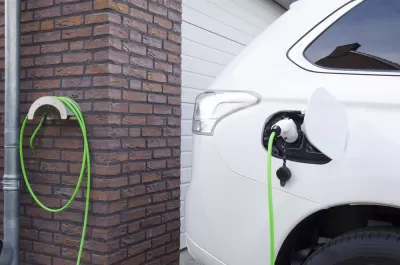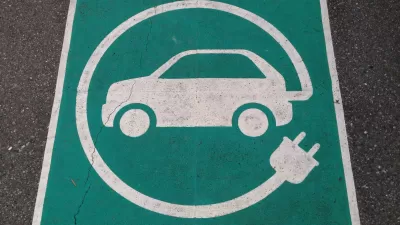Gov. Phil Murphy signed legislation Friday establishing an incentive program for purchasing battery electric vehicles, allowing up to a $5,000 rebate, the nation's highest, plus $500 rebates for home-chargers. EVs are already exempt from sales tax.

"The bill also codifies the Murphy Administration’s goal of 330,000 registered light-duty electric vehicles by 2025 and directs state-owned light-duty vehicles to be electric by 2035," according to the governor's office. However, Tom Johnson, NJ Spotlight's energy and environment writer, explains in the source article that there is more to it.
In the past, New Jersey has fallen behind many other states in the region in the switch to cleaner running cars, which it needs to do after opting to adopt a California program to put more zero-emission cars on its roads.
Under that program, New Jersey needs to put 330,000 electric vehicles on the road by 2025. It rises to 2 million in another 10 years and 85% of all light-duty vehicles by 2040.
"New Jersey was the first state in the country to pass clean cars standards through legislative vote more than 15 years ago, according to Environment New Jersey. The model year 2009 electric vehicles became subject to the California standard, according to the California Air Resources Board [pdf]. Colorado became the tenth state to join the group last summer. However, the program is essentially on life-support due to action taken by the Trump administration in September.
Zero-emission buses and trucks
The legislation directs NJ TRANSIT to purchase all-electric buses by 2032, according to the governor's office, and "directs the Department of Environmental Protection and Board of Public Utilities to establish goals for the electrification of medium and heavy-duty vehicles."
Home charging
The legislation also directs the Board of Public Utilities to establish an incentive program for the purchase and installation of in-home electric vehicle charging equipment up to $500 per person. Both incentive programs will run for 10 years.
Sales tax exemption
While the Garden State may be coming late to the EV rebate program, it has offered a sales tax exemption since 2004. "The incentives could be combined with a current federal tax credit to potentially bring the sticker price of a $40,000 electric vehicle, for example, into the $28,000 range," reports Frank Kummer for The Philadelphia Inquirer on the signing of the landmark legislation.
What about California?
As for competition from the state that began the ZEV program in 1990, the California Air Resources Board reduced the standard rebate for a battery-electric vehicle rebate from $2,500 to $2,000 on December 3 for those consumers who qualify – the state sets a cap on income and also on the sales price of the vehicle. Scroll down to "EV rebates and eligible models decrease" in the December 14 post, "California Climate Program Offers Up to $9,500 Toward Purchase of Used EVs."
Related in Planetizen:
-
New Jersey Power Company Goes Carbon-Free, August 1, 2019,
-
Gubernatorial Elections Have Environmental Consequences, November 13, 2017
Hat tip to Josh Chetwynd, U.S. PIRG.
FULL STORY: Aggressive Program to Electrify NJ Transportation Ready to Launch Today

Maui's Vacation Rental Debate Turns Ugly
Verbal attacks, misinformation campaigns and fistfights plague a high-stakes debate to convert thousands of vacation rentals into long-term housing.

Planetizen Federal Action Tracker
A weekly monitor of how Trump’s orders and actions are impacting planners and planning in America.

Chicago’s Ghost Rails
Just beneath the surface of the modern city lie the remnants of its expansive early 20th-century streetcar system.

Bend, Oregon Zoning Reforms Prioritize Small-Scale Housing
The city altered its zoning code to allow multi-family housing and eliminated parking mandates citywide.

Amtrak Cutting Jobs, Funding to High-Speed Rail
The agency plans to cut 10 percent of its workforce and has confirmed it will not fund new high-speed rail projects.

LA Denies Basic Services to Unhoused Residents
The city has repeatedly failed to respond to requests for trash pickup at encampment sites, and eliminated a program that provided mobile showers and toilets.
Urban Design for Planners 1: Software Tools
This six-course series explores essential urban design concepts using open source software and equips planners with the tools they need to participate fully in the urban design process.
Planning for Universal Design
Learn the tools for implementing Universal Design in planning regulations.
planning NEXT
Appalachian Highlands Housing Partners
Mpact (founded as Rail~Volution)
City of Camden Redevelopment Agency
City of Astoria
City of Portland
City of Laramie





























